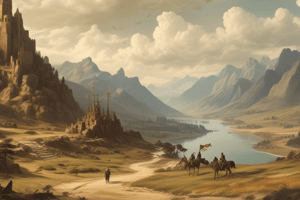Podcast
Questions and Answers
What era of history began with the invention of writing and ended with the fall of the Western Roman Empire?
What era of history began with the invention of writing and ended with the fall of the Western Roman Empire?
- Ancient History (correct)
- Prehistory
- Early Modern History
- Medieval History
Which of the following historical events occurred around 10,000 BCE?
Which of the following historical events occurred around 10,000 BCE?
- The Enlightenment
- The Crusades
- Agricultural Revolution (correct)
- Rise of Civilizations
Who is an example of a Medieval Monarch?
Who is an example of a Medieval Monarch?
- Alexander the Great
- Charlemagne (correct)
- René Descartes
- Napoleon Bonaparte
What is the primary focus of the historical theme 'Empires and Imperialism'?
What is the primary focus of the historical theme 'Empires and Imperialism'?
When did the Modern History era begin?
When did the Modern History era begin?
What is the time period of the Classical Antiquity?
What is the time period of the Classical Antiquity?
Flashcards are hidden until you start studying
Study Notes
Eras of History
- Prehistory: Before written records, from emergence of humans to development of writing systems
- Ancient History: From invention of writing to fall of Western Roman Empire (3000 BCE - 476 CE)
- Medieval History: From fall of Western Roman Empire to Renaissance (476 - 1450 CE)
- Early Modern History: From Renaissance to French Revolution (1450 - 1789 CE)
- Modern History: From French Revolution to present day (1789 CE - present)
Major Historical Events
- Agricultural Revolution: Emergence of agriculture, circa 10,000 BCE
- Rise of Civilizations: Development of cities, states, and empires (e.g. Mesopotamia, Egypt, China)
- Classical Antiquity: Golden age of ancient Greece and Rome (500 BCE - 476 CE)
- The Crusades: Series of holy wars between Christians and Muslims (1095 - 1291 CE)
- The Enlightenment: Era of intellectual and cultural transformation in Europe (1685 - 1815 CE)
Historical Figures
- Ancient Leaders: Alexander the Great, Julius Caesar, Cleopatra
- Medieval Monarchs: Charlemagne, King Arthur, Richard the Lionheart
- Enlightenment Thinkers: René Descartes, John Locke, Voltaire
- Revolutionary Leaders: George Washington, Maximilien Robespierre, Napoleon Bonaparte
Historical Themes
- Empires and Imperialism: Rise and fall of empires, colonialism, and imperialism
- War and Conflict: Causes, courses, and consequences of wars throughout history
- Culture and Society: Development of art, literature, science, and technology
- Politics and Government: Evolution of political systems, ideologies, and institutions
Eras of History
- Prehistory spans from the emergence of humans to the development of writing systems
- Ancient History lasted from 3000 BCE to 476 CE, covering the invention of writing to the fall of the Western Roman Empire
- Medieval History covers the period from 476 CE to 1450 CE, from the fall of the Western Roman Empire to the Renaissance
- Early Modern History spans from 1450 CE to 1789 CE, from the Renaissance to the French Revolution
- Modern History began in 1789 CE and continues to the present day
Major Historical Events
- The Agricultural Revolution marked the emergence of agriculture, circa 10,000 BCE
- The Rise of Civilizations saw the development of cities, states, and empires such as Mesopotamia, Egypt, and China
- Classical Antiquity was a golden age of ancient Greece and Rome, spanning from 500 BCE to 476 CE
- The Crusades were a series of holy wars between Christians and Muslims, lasting from 1095 CE to 1291 CE
- The Enlightenment was an era of intellectual and cultural transformation in Europe, from 1685 CE to 1815 CE
Historical Figures
- Ancient leaders include Alexander the Great, Julius Caesar, and Cleopatra
- Medieval monarchs include Charlemagne, King Arthur, and Richard the Lionheart
- Enlightenment thinkers include René Descartes, John Locke, and Voltaire
- Revolutionary leaders include George Washington, Maximilien Robespierre, and Napoleon Bonaparte
Historical Themes
- Empires and Imperialism explore the rise and fall of empires, colonialism, and imperialism
- War and Conflict examine the causes, courses, and consequences of wars throughout history
- Culture and Society delve into the development of art, literature, science, and technology
- Politics and Government follow the evolution of political systems, ideologies, and institutions
Studying That Suits You
Use AI to generate personalized quizzes and flashcards to suit your learning preferences.




